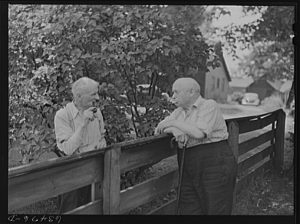By Paul Orsmond and Dr Eleanor Atkins
Learning in a community of practice (CoP) is relational, it occurs though participating in practice with others (Lave and Wenger 1991). Learning involves a person developing new identities. What learners do, and the understandings they make, does not exist in isolation. Everything is in context. New knowledge is always knowledge in person in practice, this is called knowledgeability. Students form a community of practice. We can see students participating in different
practices outside the formal curriculum. Many students are capable social learners. This is learning in time within a changing world.

Why is this important?
Our university is made of different communities, which boundary on to each other. Just as neighbours talking across a garden fence can learn a lot about each other, so crossing the boundary of another community can be a learning opportunity. We get exposed to different types of engagement, different research methods, different histories. We escape from our silos.

Why is this helpful to know?
In phenomenon-based Learning (PhBL), a phenomenon, such as global climate change, encourages students to learn within a contemporary context. Humans are increasingly considered as integral to the natural world and a massive driver of change, how individuals attain their goals, requires greater awareness and consideration of others in our global society.
Can community learning facilitate this process of greater awareness?
Understanding PhBL as a substructure of a CoP, allows us to frame a university wide Global Challenge. A challenge to address, within our University and local community, the UN 17 Sustainable Development Goals (SDG). Within learner communities and crossing community boundaries using relational learning approaches, inter/transdisciplinary engagement occurs. Learners address questions of responsibility. Learners recognise diversity. There are many different values, and research methodologies. Learners recognise that knowledge is often provisional and incomplete. There are different ways of ‘reading the world’, some in opposition to our own. There are ethical issues such as ethics of care. ‘Care’ has been recognised as what humans do to maintain and repair our world so that all inhabitants can live in it (Tronto, 1993). Within a CoP framework, we can use PhBL to allow learners not only to understand the pre-existing world, but to have emergent learning (Osberg and Biesta, 2007), defined as ‘the creation of new properties’. Here, knowledge is understood as not relating to the present, but takes the learner to new realities. Imagination is important in community learning. This is learning in time to save the planet.
Who would be involved in this Global Challenge?
Traditional learners at university are often thought of as students. But, from a community perspective, we are all learners. All members of the university can be involved in the Global Challenge. All of us have an ethics of care responsibility. The SCoLPP Global Challenge session on 30th March is an opportunity for us all to come together and begin planning how we address the UN 17 Sustainable Development Goals. This is something we can all be involved in. This is learning in time together.

